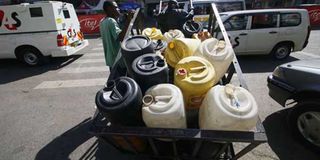Nakuru residents cautioned against buying untreated water

Vendors hawking water in Nakuru Town. The Nakuru County government has cautioned residents against buying untreated water from vendors. PHOTO | SULEIMAN MBATIAH | NATION MEDIA GROUP
What you need to know:
- Areas hard hit by water shortage include Lower Solai in Rongai Sub-County, Elementaita, Longonot and Gilgil.
- Mr King'ori said they have also embarked on the inspection of all food joints across the county.
- All food joints required to have standard toilets, medical covers and documents that permit workers to handle food.
- Public health officers have been deployed to the various areas to ensure meals sold to consumers are safe.
The Nakuru County government is on a high alert over possible outbreak of waterborne diseases following a rise in the number of water vendors as the dry spell persists in various parts of the country.
The public health department has embarked on water inspection which includes distribution of chlorine for water treatment in villages.
County Public Health Officer Samuel King’ori said they have started distributing chlorine to various villages that have in the past reported outbreak of diseases.
“We have so far supplied chlorine tablets in the areas of Mogotio, Naivasha, Nakuru Town West, Nakuru Town East and Gilgil,” he said.
While cautioning residents against purchasing water from unauthorised vendors, Mr King’ori noted that the areas that are hard hit by water shortage include Lower Solai in Rongai Sub-County, Elementaita, Longonot and Gilgil.
“Residents from the affected areas should only purchase water from authorised vendors because there are cases of those [taking] advantage of [the] current shortage to supply water drawn from contaminated sources,” said Mr King’ori.
INSPECT FOOD JOINTS
He added that apart from being cautious of the water sources, they have also embarked on the inspection of all food joints across the county.
“We are taking all the necessary precautions and food handlers should observe high levels of [hygiene],” he said.
He noted that all food joints should ensure that they have standard toilets, medical covers and documents that permit workers to handle food and clean water for washing hands.
He noted that public health officers have been deployed to the various areas to ensure meals sold to consumers are safe.
“The officers will inspect all butcheries, hotels and highway stopover food businesses along Mai Mahiu, Longonot, Kikopey, Salga and Total areas,” he said.
In 2016, the department closed various butcheries in Nakuru including the popular nyama choma stopover at Kikopey trading centre along the Nairobi-Nakuru Highway, citing poor hygiene standards.
He said Nakuru’s location along the highway makes it prone to diseases like cholera.





